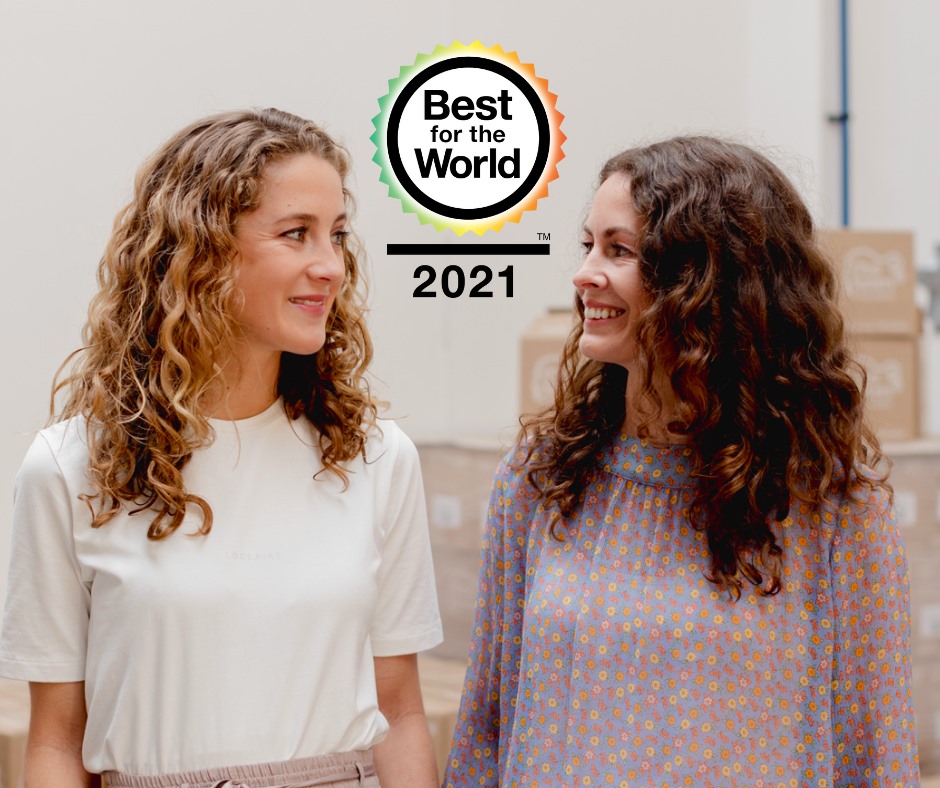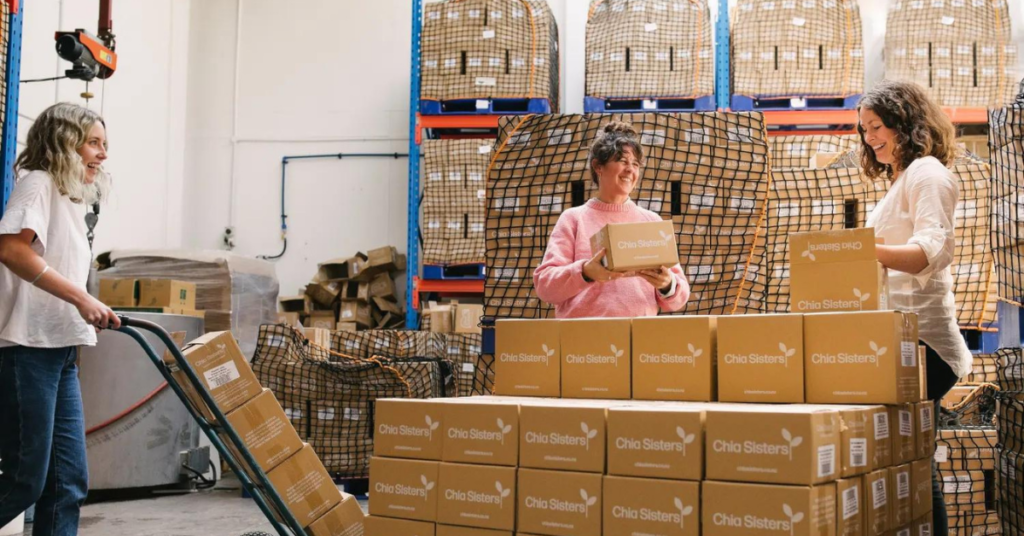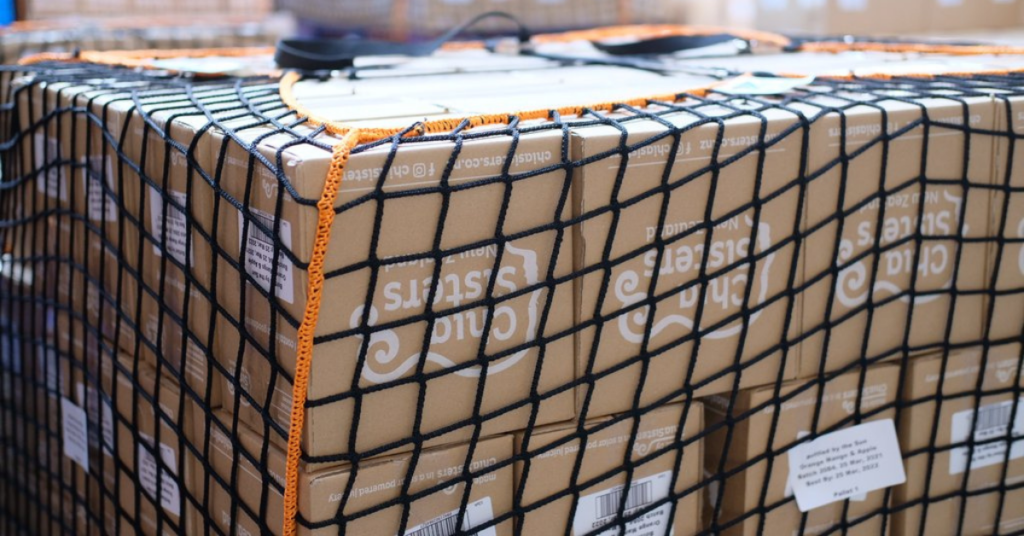Named on B Lab’s Best for the World 2021 list for Environment and one of the highest scoring B Corp’s in our region, sister-run juicery Chia Sisters has been redefining business as usual since the first drop of their solar-powered, zero carbon and climate positive health drinks was bottled.
It all started back in 2012 when Co-founder Chloe Van Dyke was working as a Neuroscientist, tinkering around in the garage with health and wellbeing drinks for her father, a world champion swimmer, and her sister, a triathlete. With the ambitious goal of making them the most nutritious drink in the world, Chloe’s first prototype blended hydrated chia seeds with local blackcurrants and the results were explosive – literally.
“There are probably still chia seeds on the roof of that factory,” she admits. So how did they get from A – explosive health drinks to B – becoming a certified better business?
Taking us ‘Behind The B’ to the picturesque surrounds of Whakatū Nelson (Aotearoa, New Zealand), Chloe shares how becoming a Certified B Corporation enabled Chia Sisters to codify their commitments to ‘unusual business’ and use their products as a vehicle to prioritise the wellbeing of people and the environment in a way they never thought possible. Bottoms up!

Co-founders of Chia Sisters, Florence and Chloe Van Dyke
If you’re already ethical, why bother certifying?
When I started Chia Sisters, I always had this idea of having a business that does things well at every step and in every decision that’s made. At the beginning most people would suggest giving five cents per bottle to a charity and then to base our brand around that activity. which is a lovely thing to do. But I thought:
‘Surely this shouldn’t just be about one thing. It must be something you spread across everything you do. You must have that integrity at every step of the way and be continually learning, advancing, and getting better.’
I didn’t know about B Corps at the time, so I started to create an ethical framework within Chia Sisters to see how we could be both ethical and profitable, while growing accordingly.
As we grew, I heard people talk about B Corp and the certification process but I had always been unsure about certification processes in general. I wasn’t interested in acquiring a new certification logo or ticking boxes. I wanted something where we could learn and understand what we could be doing better and that would help us take steps towards that.
Then I found B Lab’s free B Impact Assessment and was blown away by the fact it was an ethical framework – something I was trying to evolve all by myself and it already existed!
There is a lot of thought and care that goes into the different questions – I was really impressed by the level of thought that had gone into the B Corp certification process. It’s not perfect, it’s still evolving, because ethics continually evolve. Once I realised it was just what we needed, I jumped right on board and have learned a lot through the process.
READ: Five things to check before submitting your B Impact Assessment ↗
The ‘aha’ moment
There were a lot of questions in there that I had never thought about before (and I had thought about things quite a lot). So, it wasn’t really a challenge, more of an ‘aha’ moment.
Simply put, ‘business as usual’ is quickly destroying our planet. That doesn’t work for us. We care about the planet we live on, the communities we operate in and the people we work with.
In our ambition to do better business it is important to hold ourselves accountable. It’s nearly impossible to run a perfect business, and it’s always going to be a work in progress.

Document, document, document
While, at first, I was put off by all the documentation involved in the certification process, I now realise how important it is – it’s not good enough to hold this information only in your head.
The documentation helps ensure the continuity and regularity of the framework, along with transparency for stakeholders such as employees, suppliers and customers.
There was even a question asking whether we cover employees’ names and addresses prior to interviewing to remove any unconscious bias. I hadn’t thought of that before and that was an important learning because we all have unconscious biases, even if we don’t think we do.
Another thing we love about being a B Corp is that you have to create a legally binding constitution that ensures the longevity of the ethical framework we have created. If there is a change of management, if investors come on board, or if the business is sold it must continue to operate in a way that prioritises social and environmental good alongside profit.
This is to overcome the dilemma that businesses are required, by law, to always operate in the best interest of its shareholders, which is often translated to what will make the most profit for shareholders even at the expense of social and environmental good.
READ: A full how-to guide for changing your constitution to become a Certified B Corporation ↗

Progress over perfection
For us, it has never been about being the best – it has always been about being one of many. Bringing our personal values into our business is where it started. Florence and I grew up with solar panels and planting trees. Our parents sold possum fur hats to save the forests, so it’s ingrained in us.
It was important to us that when we came to work, we didn’t need to be someone else. I think a lot of people have what they do at home, then come to work and act differently. We didn’t want that to be the case for us or our team.
Our team has always been keen to be involved and they’ve got behind initiatives and put forward ideas that have then been implemented such as composting, reusable net covers for pallets, even using the cardboard toilet roll inners for growing vegetables. And our community is also really encouraging this – for instance, the local Nelson Council has declared a climate emergency, and we have a lot of community support for businesses like ours.
In 2021, we implemented reusable rope covers to replace plastic pallet wrap, saving four cubic metres of single use plastic per year. We have installed 32 solar panels on our factory roof, gained zero carbon and climate positive certification, led community workshops to combat climate change and partnered with our local community to reduce food waste.
Never stop learning and improving
Recently, we needed to complete a new supplier form, which asked questions like:
- Are you zero carbon?
- Are you fair trade?
- Are you organic?
- Are you minority-owned?
- Are you a Certified B Corporation?
It was a great way of highlighting the importance of ethics throughout the supply chain in quite a subtle way, and it inspired a set of new forms for our own suppliers. The same goes for policies around direct trading, which fellow B Corp Ethique are leading the way on. We also love Raglan Food Co. Limited, who has a cool initiative for reusing water.
I love the idea of our production facility being thoughtful in everything, and water is an important aspect that can often be forgotten in New Zealand!
Best piece of advice for businesses starting their B Corp journey
Use certification as an opportunity to do good holistically, in all areas of your business. From that, you will enjoy your work a little bit more and those around you will too. Don’t use it as an avenue for ticking off what you’ve done, but as a tool to see what more you can do.
We couldn’t have said it better ourselves. Thanks to Chloe and Chia Sisters for this piece taking us ‘Behind The B’ this B Corp Month 2022. Learn more about the B Impact Assessment, the free tool thousands of businesses are using to better measure their impact ↗

